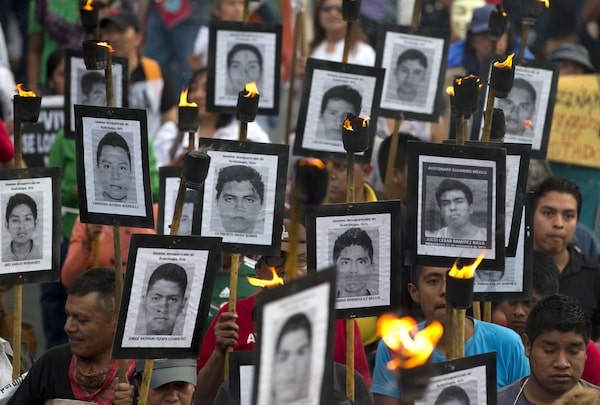
Family members of 43 missing teachers college students carry pictures of the students as they march with supporters to demand the case not be closed and that experts' recommendations about new leads be followed, in Mexico City, on April 26, 2016.Rebecca Blackwell/The Associated Press
A group of international experts investigating the 2014 disappearance of 43 students in southern Mexico warned Monday that an attempt by the government to accelerate the results has created a “crisis” for the investigation and risks diminishing confidence in the outcome.
At a crucial stage, the special prosecutor who has led the government’s investigation since 2019 resigned in September over apparent interference by the attorney-general and the government replaced him with someone unfamiliar with the case. A government Truth Commission report in August muddied the waters by presenting questionable screen captures of message exchanges as evidence, according to the Interdisciplinary Group of Independent Experts.
The group was created by the Inter-American Commission on Human Rights to investigate the abduction and forced disappearance of students from the Ayotzinapa teachers’ college in the state of Guerrero.
“To lose the existing capacity (of the experienced prosecutor and others working with him) in such a decisive moment is a serious risk for the case and will have negative consequences,” the experts said in their statement.
On Sept. 26, 2014, local police took the students off buses they had commandeered in Iguala, Guerrero. The motive for the police action remains unclear eight years later, but investigators believe drug trafficking was at least partially involved.
The students’ bodies have never been found, though fragments of burned bone have been matched to three of the students.
The experts group said that a forensic analysis of screen captures of messages allegedly sent between people participating in the abduction and disappearance of the students could not be confirmed as authentic and displayed a number of inconsistencies.
However, even without those messages, the experts insisted that there was still evidence that a number of members of the military were following the events of that night closely yet did not intervene to save the students – or even one of their own, who had infiltrated the school noted for left-wing activism.
Phone intercepts that are part of a drug trafficking case in Chicago have also established close contact between members of the military and the gang that allegedly was given the students after they were seized by police, Guerreros Unidos.
The experts said they had asked President Andres Manuel Lopez Obrador again to instruct the military to share all of its related archives on the case, including phone intercepts they say it has from the time of the abductions. They also stressed the importance of maintaining the independence of the special prosecutor.
On Sunday, the government announced the arrest of Leonardo Octavio Vazquez Perez, who was the Guerrero state security chief at the time of the students’ abduction. A former police officer from Huitzuco, a town near Iguala, was arrested last week for his alleged involvement.
The experts’ mandate was set to expire Monday, but they said that they had proposed to authorities that two members of the group stay on for at least another two months as a transitional step.
They said they were already sharing information with the new special prosecutor for the case and that sufficient evidence existed to move ahead with the prosecutions of 21 people – including 16 members of the military – for whom the Attorney-General’s Office had previously withdrawn arrest requests.
“There is a system of investigation and impunity that needs to change in Mexico,” it said, adding that at stake is the sort of country that will be inherited by new generations.